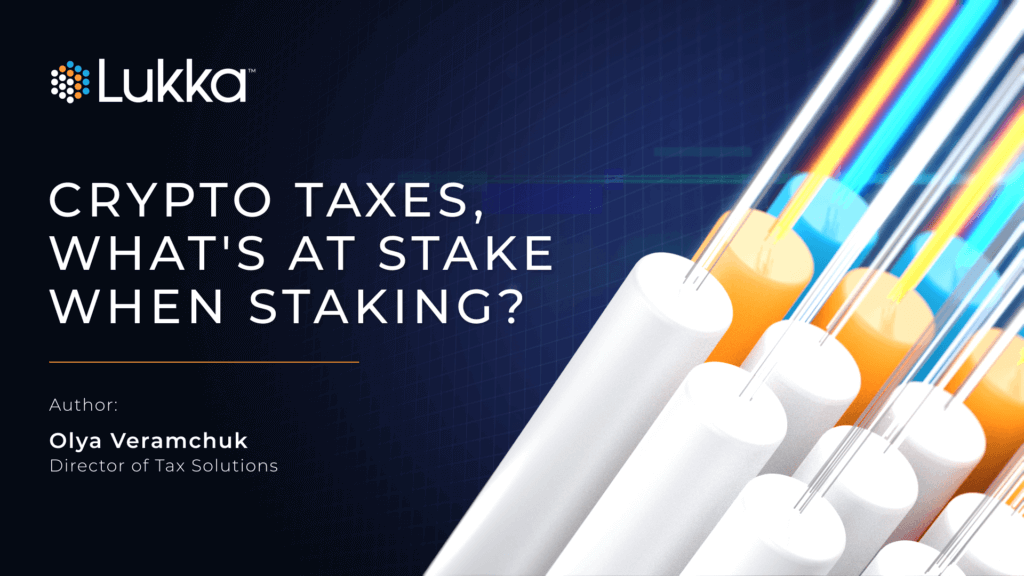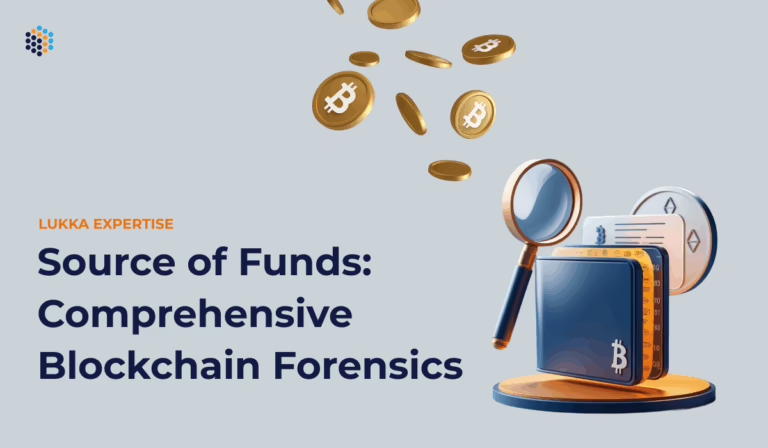Updated April 2022
Author: Olya Veramchuck, Lukka’s Director of Tax Solutions
Introduction
2021 has certainly become the “it” year for crypto assets in all regards – skyrocketing prices for many tokens, the NFT boom, and of course, all things DeFi. One of the most popular transactions in the DeFi world is staking – the process of actively participating in transaction validation on a proof-of-stake (“PoS”) blockchain by pledging money to a network in exchange for staking rewards. In a PoS system, random validators are selected in proportion to their quantity of holdings in the native cryptocurrency and/or the amount of time they have agreed to lock up the stakes in a specific digital wallet. Staking rewards are generally generated in the form of newly minted governance tokens or a share of units taken from other participants as transaction fees and are typically, although not always, paid out in the same tokens as the ones staked. One can participate in PoS protocols by running a validator node, delegating assets to a validator, contributing assets to decentralized staking pools, or staking directly on centralized cryptocurrency exchanges. Whichever avenue one chooses for their staking activities, it is key to understand the tax implications of each transaction step – staking in, receipt of rewards, and staking out. Because the Treasury has yet to issue detailed guidance for digital assets, tax practitioners must rely on the existing framework for their analysis.
Does staking in or out give rise to taxes?
At first blush, the process of staking tokens seems to be roughly the same for any asset or avenue: with a few clicks, taps, or swipe tokens either get contributed into a validator node or get delegated to a validator, who then stakes the assets in exchange for a portion of rewards earned, and remits the rest of the rewards to the delegator. However, in tax, the devil is always in the details. While it is tempting to make a sweeping generalization about the broad similarities, it is prudent to review each staking platform to ensure an understanding of the transaction executed.
The issue at stake (pun intended) is whether a gain or loss should be recognized when assets are staked in or staked out. Generally, for a realization event to occur, two requirements must be satisfied: there should be a sale or exchange of an asset, and tokens received should be materially different either in kind or in extent from the original tokens contributed.
For tax purposes, a sale occurs when sufficient benefits and burdens of asset ownership are passed from one party to the other.1 Case law provides a list of eight different factors to facilitate the analysis, and such factors should be weighted differently based on the unique facts and circumstances of each transaction. The most relevant factors in the crypto staking context include determining which party bears the risk of loss and which party receives the profits from the operation. It’s worth noting that legal ownership, although significant, is not determinative here.
Generally, Terms and Conditions (“T&C”) offered by a number of centralized crypto exchanges and staking platforms suggest that the token owner would always bear the risk of loss. Some exchanges offer limited protection against slashing penalties, but only when slashing occurs due to the exchange’s mishap while acting as a validator. In the event of a Force Majeure, a protocol bug or a hacker attack, customers would not be reimbursed for the lost assets. Staking-only platforms are even less generous in their provisions. With respect to the profit recipient factor, some T&C explicitly state that they would pass the rewards, minus the fee, to the customers as soon as the exchange or the platform receives the said rewards from the protocol. Others are more reserved and provide that the timing and the amount of the rewards to be distributed are at their sole discretion. T&C of staking platforms tend to not specifically comment on the timing or amounts of the rewards. Thus, it appears that the token holders are always bearing the burden of a loss but often are also the recipients of staking rewards. Therefore, it is unlikely that the meaningful and sufficient benefits and burdens would shift to a staking platform. Consequently, it is reasonable to suggest that the sale or exchange requirement of the realization would not be met.
The discussion above covers the plain vanilla staking, where token holders do not receive any assets in return for the staked tokens. In some instances, centralized exchanges might use a different ticker for the staked assets merely to differentiate between the liquid asset, a staked asset and staked rewards, (e.g., ETH2.S and ETH2 tickers used by Kraken for staked ETH and accrued rewards, respectively). However, even if this were viewed as an exchange of one token for the other, it is unlikely that the materially different requirement would be met. The property “received” is identical to the tokens staked, has no further functionality, does not enable any new capabilities besides serving as a differentiator between the liquid and the staked assets, and is not tradeable (well, at least in the US).
Some staking services issue synthetic representations of staked tokens, which act as liquid and independent assets and can be traded, deposited into liquidity pools, and utilized in yield farming. Examples of such derivatives include xSUSHI, bETH, stkETH, and others. Such transactions track a lot closer to the conventional crypto for crypto trades, particularly because the independent functionality of the synthetic tokens is a reasonable indicator of the new property being materially different in kind or extent. However, a careful analysis of each token/synthetic token pair is required to determine whether there should be a realization event. This is particularly important for staked ETH due to the unique considerations of the asset and the protocol.
Furthermore, an argument could be made that staking on platforms that issue derivative representations of the staked tokens is akin to contributions to limited partnerships, where a taxpayer would contribute an asset in exchange for the interest in the partnership. Similarly, one can analogize to contributions to a grantor trust. Both types of transactions do not give rise to tax. However, neither option is a perfect solution because many additional considerations arise, particularly with respect to the information reporting and tax return filing, which is required for both entity types.
To summarize: many practitioners agree that staking in and out of a protocol should generally not be treated as a taxable event for the reasons discussed above. However, new service offerings appear on the market very frequently, and it is important to understand the nuances of each staking platform on a standalone basis.
Tax Considerations for Rewards
Economically, staking of many assets is similar to a certificate of deposit, where cash gets contributed into a bank account and remains locked up for a defined period of time in exchange for accrued interest. However, crypto assets are not currency but property. Consequently, staking rewards need to be analyzed under the general tax principles applicable to property transactions, including the character of income and the timing of inclusion.
As noted above, the IRS has not yet opined on the tax treatment of staking rewards. The only somewhat relevant guidance is contained in a series of notices and CCAs. For instance, the Notice 2014-21, which addresses tax considerations for miners, suggests that mining rewards should be taxable as ordinary income upon receipt. Further, when the said rewards are disposed of, the miner would be subject to short- or long-term capital gains tax, depending on the holding period of the rewards. Revenue Ruling 2019-24 provides that a hard fork followed by an airdrop of the new cryptocurrency would result in ordinary income upon receipt, assuming the taxpayer has dominion and control over the assets at the time of the airdrop. The Hard Fork CCA 202114020 states that the date of receipt and fair market value to be included in income is dependent on when the taxpayer obtained dominion and control over an asset. Lastly, the Virtual Currency FAQs yet again refer to dominion and control and define it as an ability to “transfer, sell, exchange or otherwise dispose of [an asset].” These authorities rely on the statutory language stating that gross income “means all income from whatever source derived,2” and the existing case law, which defines income as “undeniable accessions to wealth, clearly realized, and over which the taxpayers have complete dominion.3”
Some taxpayers resolve to the conservative approach and view staking rewards as accession to wealth, which should be taxable as ordinary income at the time of receipt. Others analogize staking activities to mining minerals, growing apple orchards, and raising livestock, arguing that rewards constitute newly created property and therefore should not be subject to tax until they are disposed of. The most prominent development in this area occurred in May 2021, when a taxpayer compared staking rewards to baking a cake4 and filed a refund suit against the IRS. Notably, the refund requested was actually relatively small, about $3,500, but the case sets an important precedent for many institutional investors who are looking to participate in staking. It will undoubtedly be interesting to see the Court’s decision on the matter.
Separately, specific protocols have unstaking provisions stipulating that assets cannot be withdrawn for a period of time after the unstaking request has been made (e.g., Aave has a 10-day freeze provision, KuCoin requests 28 days for unstaking Polkadot tokens, etc.). As a result, taxpayers can argue that they do not have dominion and control over the rewards and thus, the accrued rewards should not be included in the gross income. For most assets, the inclusion issue would likely only be relevant at the end of the year, where the freeze out period could potentially carry over the ability to withdraw tokens into the new year. However, those staking ETH would likely have a much stronger non-inclusion argument, given the nature of staking that particular asset. Because neither the original asset nor the accrued rewards could be withdrawn before the network upgrade is completed (potentially, never), one can argue that it would be unreasonable to include the earned rewards as ordinary income in the year such rewards have accrued because of the definitive lack of dominion and control over the rewards.
Of course, when a taxpayer disposes of the earned rewards, any gains realized would be subject to a short- or long-term capital gains tax, depending on how long the reward tokens were held.
To summarize: the Treasury may view staking rewards in the same manner as mining income and require an ordinary income inclusion at the moment of the reward receipt. However, taxpayers could take a position that staking rewards are equivalent to new property creation and thus should only be taxed on disposition. Where taxpayers have no dominion and control over the rewards, particularly in the case of staked ETH, the non-inclusion argument could be stronger. Disposition of the rewards would always give rise to a realization event and generate short- or long-term capital gains or losses.
Other Tax Considerations
A lot of ink has been spilled above discussing some of the most burning questions related to staking (and a lot more could be added!). But the list doesn’t end there. To avoid doubling the length of this article, some of the additional considerations are very briefly discussed below.
Generally, in PoS protocols, validators who fail to perform the prescribed duties or act maliciously get punished by getting their tokens slashed. Although crypto tokens are typically treated as capital assets, for the loss to be capital, it must result from a sale or exchange of those tokens, as discussed above. Slashing is more similar to terminating a validator’s ownership rights with respect to the tokens. Tokens also do not become worthless; therefore, the provisions governing capital treatment would not apply. Consequently, it is reasonable to suggest that a validator whose tokens were slashed could get the ordinary treatment for the loss, measured by the basis they had in those tokens.
It is also important to distinguish between the taxpayers who engage in staking activities as a hobby and those who do it as a trade or business. This is because someone running validator nodes for a living would be able to deduct or capitalize and amortize costs (e.g., computer equipment costs, office rent, electricity and Internet bills, etc.) incurred in the process. They may also be eligible for the qualified business income deduction. However, any income realized would be subject to self-employment tax, in addition to the regular business income tax. By contrast, someone engaging in staking as a hobby would not be able to deduct the associated expenses or take advantage of other potentially available deductions, but they would not be liable for self-employment tax, either.
There is no bright line test that could be applied to determine whether someone’s activities rise to the level of trade or business but the tax authorities generally look to see if the activities are continuous and regular, are done for profit, and require time, attention and labor. Transaction volume is an important factor as well. The active validators who must remain connected to the Internet and maintain their computers continuously are likely similar to miners, and would probably be treated as engaged in a trade or business. Delegators and nominators, however, generally permit the validators to use their assets in return for a portion of transactional fees. Thus, their activities are unlikely to rise to the level of a trade or business. This issue would be particularly relevant for funds with foreign and tax-exempt investors looking to participate in staking pools.
Foreign investors should also consider whether the rewards should be characterized as a services fee or if they are more akin to interest or royalty due to the withholding tax considerations related to the income sourcing rules. The IRS defines interest as the amount paid for the use of borrowed money. As discussed above, cryptocurrency is not money but is property. Therefore, an argument can be made that staking rewards should not be treated as interest. Token holders who run their own validator nodes using their own equipment would probably be considered to be earning services income, which is sourced to the location of the services performed. In contrast, a delegation of assets in exchange for a fee could be viewed as a licensing arrangement yielding royalty income, which is sourced based on the location of property. However, given the decentralized nature of digital assets combined with the unique considerations of PoS ecosystem participants, making the sourcing determination would not be an easy task.
Finally, this article has focused on federal income tax considerations. However, taxpayers should bear in mind that states often do not fully adhere to the federal principles for computing taxable income, and guidance for crypto transactions from state and local authorities is currently lacking.
Overall, taxation of staking and staking rewards is a complex subject. Given the lack of guidance, taxpayers and practitioners are encouraged to consider the discussion above and proceed with caution based on their individual risk tolerance levels.
1 Grodt & McKay Realty, Inc., 77 TC 1221, 1237, Dec. 38,472 (1981)
2Sec. 61(a)
3Commissioner v. Glenshaw Glass Co., 348 U.S. 426, 429 (1955)
4Jarrett v. United States, Case No. 3:21-mc-09999 (M.D. Tenn. May 26, 2021)
The information contained in this bulletin provides only a general overview of current tax issues related to staking and shall in no event be construed as the rendering of professional advice or services. As such, the information provided in this bulletin should not be used as a substitute for consultation with professional advisors. Before making any decision or taking any action regarding your digital currencies or the tax treatment thereof, you should always consult with an appropriate, licensed tax, accounting, or other professional. To the fullest extent permitted by law, in no event will Lukka, Inc. (including its related entities, owners, agents, directors, officers, advisors or employees) be liable to any reader of this bulletin or anyone else for any direct, indirect or consequential loss or loss of profit arising from the use of this bulletin, its contents, its omissions, reliance on the information contained within it, or on opinions communicated in relation thereto or otherwise arising in connection therewith.



